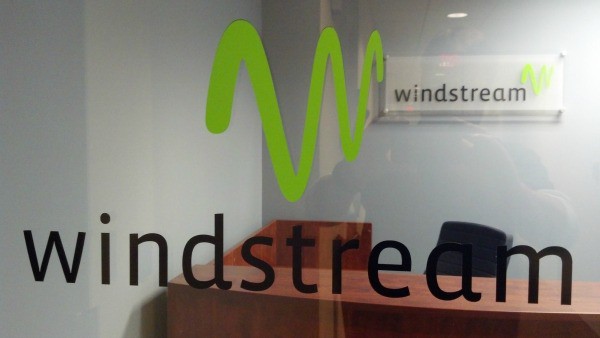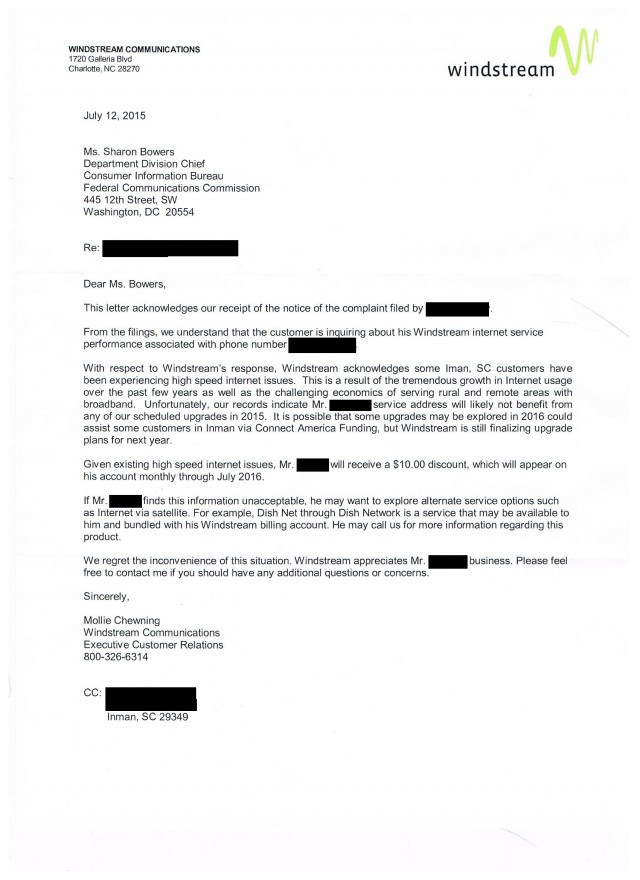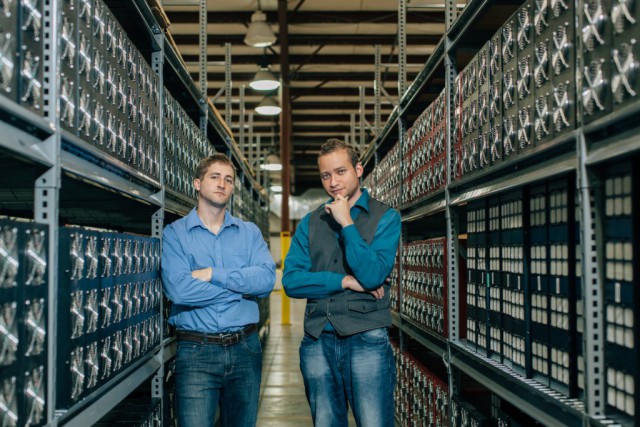
On the outside looking in.
Windstream’s DSL service in parts of Inman, S.C. is so bad, the company has recommended some DSL customers consider signing up for a competitor’s satellite-based Internet service instead.
In a remarkable response to a complaint filed with the Federal Communications Commission by a Windstream customer, Mollie Chewning, an executive customer relations representative for Windstream, suggested no broadband upgrades were likely before 2016 and beyond a $10 monthly discount for a year, customers in Inman will just have to live with DSL speeds that are often less than 1Mbps or consider switching to satellite-delivered Internet from another company.
“Windstream acknowledges some Iman [sic], SC have been experiencing high-speed Internet issues,” Chewning wrote Sharon Bowers, the department division chief of the FCC’s Consumer Information Bureau. “This is a result of the tremendous growth in Internet usage over the past few years as well as the challenging economics of serving rural and remote areas with broadband. Unfortunately, our records indicate Mr. [redacted] service address will likely not benefit from any of our scheduled upgrades in 2015. It is possible some upgrades may be explored in 2016 could assist some customers in Inman via Connect America funding, but Windstream is still finalizing upgrade plans for next year.”

Speed test results
James Corley, the victim of Windstream’s poor-performing DSL, launched a blog to get Windstream moving on upgrades or entice area cable operator Charter Communications to wire his neighborhood for service.

Inman, S.C.
“I am a resident of a small subdivision […] and for nearly a decade, we have been forced to rely on Windstream Communications’ disgraceful DSL internet and telephone services,” Corley writes. “The company’s representatives have been promising us for years that we would be upgraded to faster speeds but the promised upgrades have repeatedly failed to materialize and even though I cannot say for sure where Windstream’s priorities lie, it certainly isn’t with their customers.”
Corley is not asking for much. He’s subscribed to a basic 3Mbps service plan. Windstream does not come close to delivering even those speeds, however, with speed test results showing performance ranging usually below 1Mbps all the way down to 40kbps — less than dial-up.
“Given existing high-speed Internet issues, Mr. [redacted] will receive a $10 discount, which will appear on his account monthly through July 2016,” Chewning wrote. “If Mr. [redacted] finds this information unacceptable, he may want to explore alternate service options such as Internet via satellite.”
Corley has elected to pursue Charter Communications instead. It can offer considerably faster speeds than Windstream or satellite providers at a much lower cost. But Charter has thus far refused to wire Corley’s neighborhood for free. Charter wants at least $7,000 to extend service to the subdivision, after which it will start construction and deliver service within 45 days. Charter has no problem spending $55 billion to acquire Time Warner Cable but is unwilling to spend $7,000 to attract most, if not all 16 residents on the customer’s street.
Windstream appears to be more interested waiting for telephone ratepayers across the country to subsidize incremental improvements in its slow speed DSL service through the Connect America Fund, which has a poor record subsidizing cable operators to bring far superior broadband service to customers like those in Inman.
Until the Windstream customer and his neighbors manage to scrape together $7,000, or Charter extends service at no charge in the name of good public relations, residents of Inman (and beyond) are stuck with Windstream broadband that does not come close to broadband.


 Subscribe
Subscribe WASHINGTON/DURANT, Okla. (Reuters) – U.S. President Barack Obama announced a pilot project on Wednesday aimed at expanding broadband access for people who live in public housing, part of an effort to close what Obama called the “digital divide” between rich and poor.
WASHINGTON/DURANT, Okla. (Reuters) – U.S. President Barack Obama announced a pilot project on Wednesday aimed at expanding broadband access for people who live in public housing, part of an effort to close what Obama called the “digital divide” between rich and poor. “While high-speed Internet access is given for millions of Americans, it’s out of reach for far too many,” Obama said at Durant High School to a crowd that included many children in traditional tribal garb.
“While high-speed Internet access is given for millions of Americans, it’s out of reach for far too many,” Obama said at Durant High School to a crowd that included many children in traditional tribal garb. In select markets, Sprint will offer free wireless broadband access to families with kids in public housing. In Seattle, CenturyLink Inc will provide broadband service for public housing residents for $9.95 a month for the first year.
In select markets, Sprint will offer free wireless broadband access to families with kids in public housing. In Seattle, CenturyLink Inc will provide broadband service for public housing residents for $9.95 a month for the first year. One of the few “white space” wireless broadband projects deployed in the United States to deliver broadband to rural residents has
One of the few “white space” wireless broadband projects deployed in the United States to deliver broadband to rural residents has  Despite the delays, there are estimates another 40-50 households will be able to get the service by the end of summer.
Despite the delays, there are estimates another 40-50 households will be able to get the service by the end of summer.

 Enter GAW, which stands for “Geniuses At Work.” Garza’s business depended on a steady stream of clients investing in his enormous mining operation. GAW Miners claimed it has 200,000 customers and $120 million in revenue in just six months. GAW also reportedly collected 28,000 Bitcoins worth over $10 million in just two months.
Enter GAW, which stands for “Geniuses At Work.” Garza’s business depended on a steady stream of clients investing in his enormous mining operation. GAW Miners claimed it has 200,000 customers and $120 million in revenue in just six months. GAW also reportedly collected 28,000 Bitcoins worth over $10 million in just two months.
 Frontier Communications
Frontier Communications 